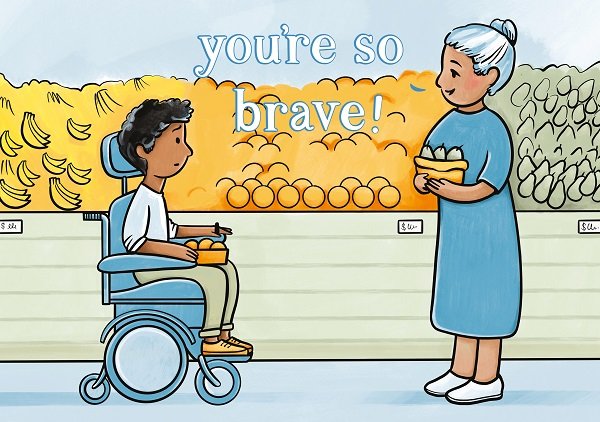You're so brave!
This conversation questions the thinking that disabled people are brave for doing ordinary, everyday activities. It explores what the word brave actually means and why using the word can reflect a negative view of the life of disabled people.
You can watch a replay of our livestream conversation here.
You can find a PDF, Easy Read, Te Reo PDF and large print Word format for you to use in the resources section. You can watch the NZSL translation of this conversation starter here.
You can borrow a braille translation of this resource though the CCS Disability Action Library and Information services.
The ‘You’re so brave’ conversation, part of CCS Disability Action’s ‘Language Matters’ series, questions the thinking that disabled people are brave for doing ordinary, everyday activities. The conversation explores what the word brave means and why using the word can reflect a negative view of the life of disabled people, and covers the following themes:
Ableism: unveiling the truth
Ableism, defined as discrimination or prejudice against individuals with impairments, is deeply rooted in societal norms and perceptions. The notion that disabled people are brave for engaging in routine tasks perpetuates a harmful stereotype that undermines their autonomy and reinforces a sense of otherness. It is crucial to challenge this narrative and recognise the inherent dignity and agency possessed by disabled people.
The fallacy of bravery
The word “brave” typically evokes images of heroic acts or extraordinary feats. However, when applied to disabled individuals for merely carrying out everyday activities, it diminishes their experiences and reinforces ableist attitudes. Disabled people should not be praised for their ability to navigate the world; rather, they should be afforded the same opportunities and respect as their non-disabled counterparts.
A distorted lens
The objectification of disabled individuals for the purpose of inspiring non-disabled people for their perceived bravery perpetuates a voyeuristic gaze that reduces disabled individuals to objects of pity or admiration. Framing disabled people as inspirational solely based on their ability to perform mundane tasks, further marginalises them and reinforces ableist narratives.
The negative impact
The perception that disabled individuals are brave for engaging in everyday activities has far-reaching consequences. Firstly, it perpetuates a patronising attitude towards disabled people, undermining their agency and reinforcing stereotypes. Secondly, it creates an unrealistic expectation for disabled individuals to constantly prove their worth through acts that are considered ordinary for non-disabled individuals. Lastly, it diverts attention from systemic issues such as accessibility and inclusion, focusing instead on individual achievements.
Time to reframe the narrative
The notion that disabled people are brave for performing ordinary tasks is rooted in ableism and perpetuates harmful stereotypes. By challenging this narrative and reframing our understanding of courage, we can foster a more inclusive society that values the autonomy and dignity of all individuals. It is important to recognise that disabled people should not be objectified or praised for their ability to navigate the world; rather, they should be afforded equal opportunities and respect.
If you’re interested in this topic and would like to spark a conversation with people around you, check out the range of ‘You’re so brave!’ resources we have available. These are designed to support you and others to think differently about the language we use about disabled people.

